Best Flexible Solar Panels for RV
Looking for the perfect flexible solar panel for your RV? You’ve come to the right place! We’ve gathered a list of the best options available to make your RV adventures even more eco-friendly and efficient. So let’s dive right in and have a look at these amazing products, shall we?
Renogy Flexible Solar Panel 175 Watt 12 Volt Monocrystalline

Upgrade your RV’s solar setup with Renogy’s lightweight and adaptable 175W panel – perfect for airstreams, campers, and boats.
Pros
- Extremely flexible for mounting on curved surfaces
- Ultra lightweight for easy transportation and installation
- Highly durable withstanding wind and snow loads
Cons
- Requires professional guidance for installation
- May not provide 175W consistently
- Some users report quality control issues
Renogy’s 175W Flexible Solar Panel is an innovative product that offers unprecedented convenience and adaptability for those seeking to harness solar energy in their recreational vehicles. With its ultra-lightweight design and extreme flexibility, it makes transportation and installation a breeze. This panel is designed specifically for applications where standard panels would be difficult or inconvenient to mount, such as curved surfaces on RVs and boats.
Unfortunately, the installation process can be a bit challenging, as it requires the use of silicone structural adhesive on the backside of the panel for mounting. It is highly recommended to consult a local contractor for guidance during installation. Despite its many advantages, some users report that it may not always provide the full 175W of power, impacting overall performance. Finally, there have been a few cases where users experienced quality control issues, such as white spots and bubbles forming on the panels.
Despite these drawbacks, we believe that the Renogy Flexible Solar Panel 175 Watt 12 Volt Monocrystalline is a great option for those looking to upgrade their RV or boat solar setup. Its unique combination of flexibility, lightweight design, and durability make it ideal for adventurers on the go. Just make sure to seek professional guidance during installation and evaluate each panel for any defects before installing them on your vehicle.
Topunive 100W 12V Flexible Solar Panel
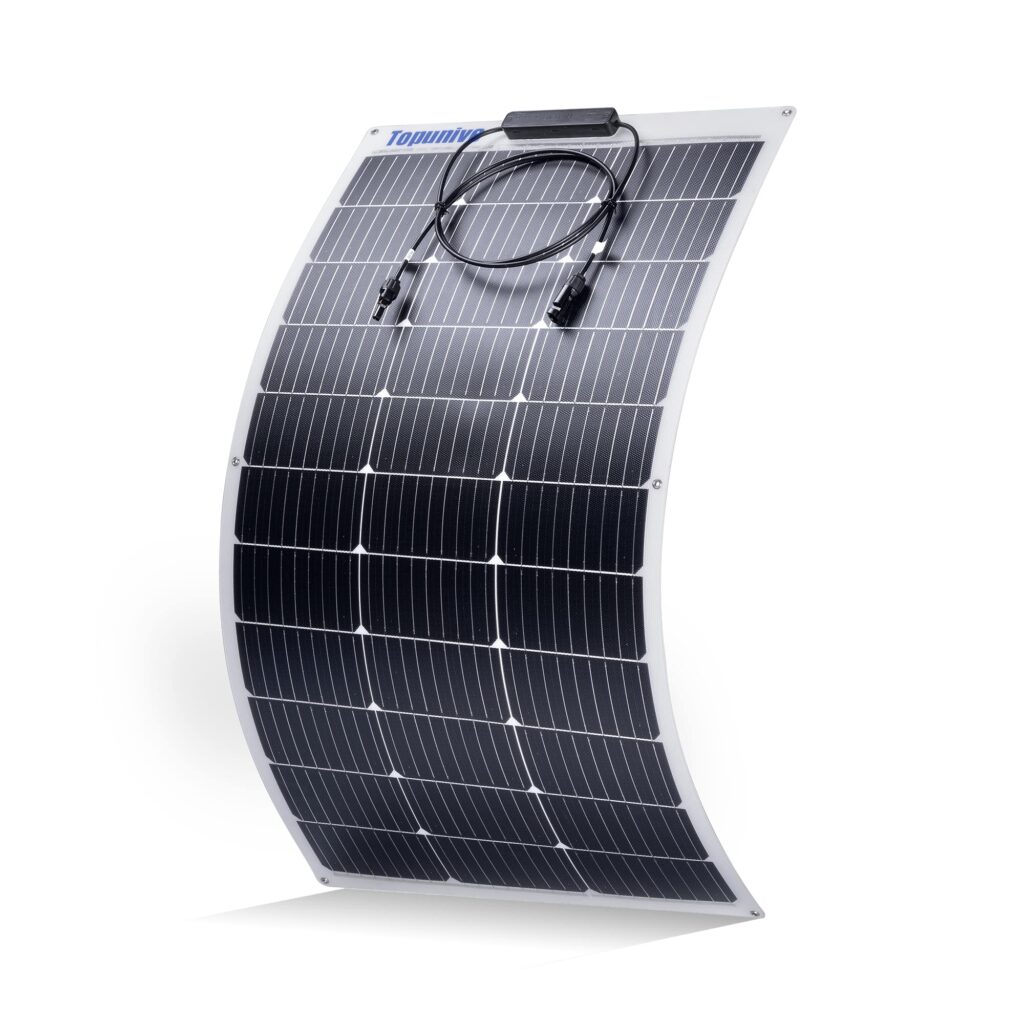
This Topunive solar panel is a great option for those needing a flexible and lightweight solution for their RV or other off-grid applications.
Pros
- Extremely flexible for various mounting surfaces
- Lightweight and easy to install
- High conversion efficiency with 9 busbars solar cell
Cons
- May have less wattage output compared to competitors
- Grommet size may require modification for some mounting systems
- Durability concerns due to lightweight design
The Topunive 100W flexible solar panel is designed with the RV traveler in mind. Its ability to flex down to a 17.7-inch radius makes it ideal for installing on curved or uneven surfaces, like the roof of an RV, camper, or boat. The lightweight design, weighing only 4.4 lbs, is also a major advantage for those who need portability and ease of installation.
This solar panel features 9 busbars monocrystalline silicon cells, which contribute to its high conversion efficiency of 23%. This translates to more power output from less sunlight, making it a valuable investment for those relying on solar energy. However, some reviews mention that the wattage output may be lower than expected, so it’s essential to consider your specific energy needs before purchasing.
One notable downside of this solar panel is the grommet size provided for mounting. Some customers reported needing to modify the grommets to accommodate their preferred mounting hardware. In addition, the lightweight design, while perfect for portability, may raise concerns about durability and longevity in harsh outdoor conditions.
In conclusion, the Topunive 100W flexible solar panel is a good option for RV travelers and others needing a versatile solution for off-grid power generation. Its flexibility, lightweight design, and high conversion efficiency are balanced by some concerns regarding wattage output and durability. As always, consider your unique energy requirements when making a purchase decision.
Renogy Solar Panel 100W 12V Lightweight
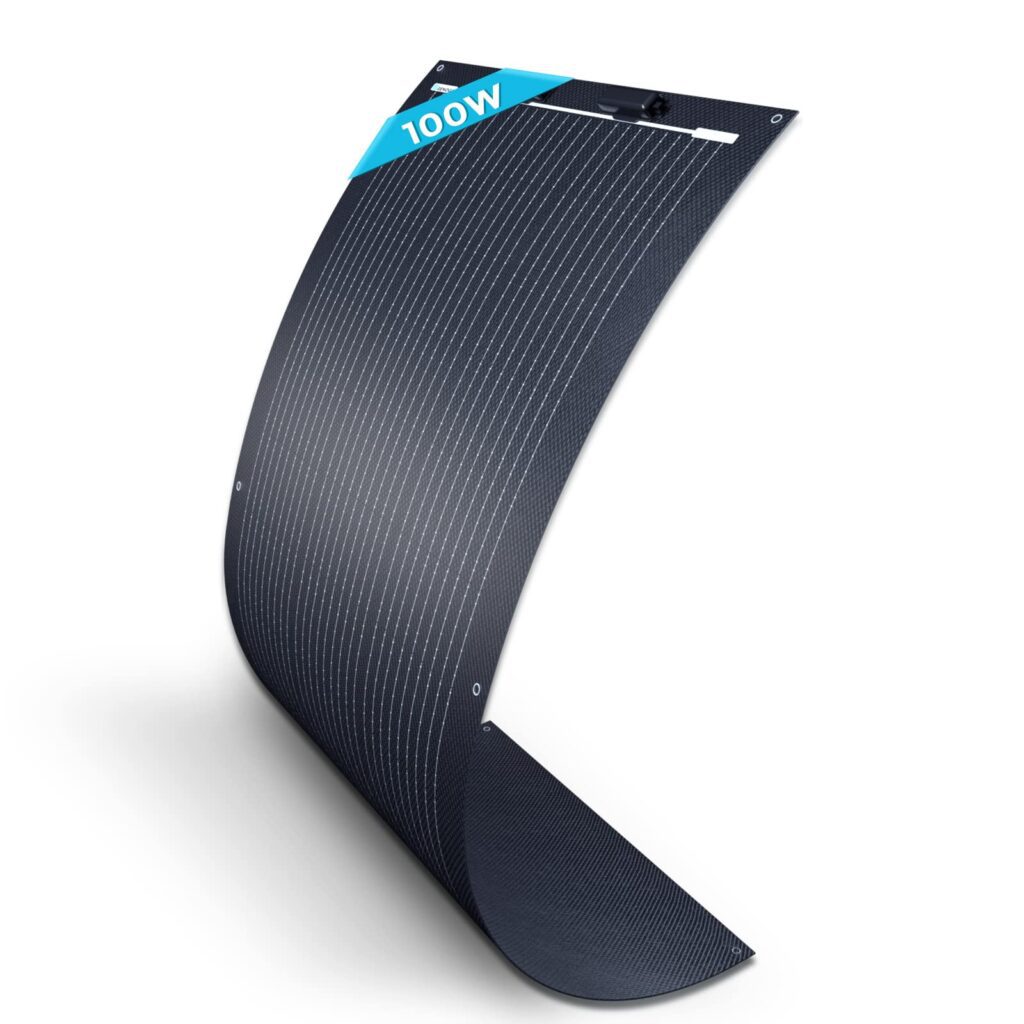
Renogy’s lightweight semi-flexible solar panel is a solid investment for those seeking a reliable and convenient off-grid power source for their RV.
Pros
- High power output and efficiency
- Easy to transport and compatible with curved surfaces
- Durable with waterproof features
Cons
- May not achieve the full 100W as advertised
- Possible decline in performance over time
- Limited flexibility, not suited for extreme bending
Renogy’s Solar Panel 100W 12V Lightweight Semi Flexible Black Division Monocrystalline Bendable Mono Off-Grid Charger offers a great power output that can provide an average of 500 Watt-hours of electricity per day, depending on sun availability. It is made from high-efficiency monocrystalline silicon, making it an excellent choice for RV owners looking for a reliable power source.
One of the key benefits of this solar panel is its ease of transport and compatibility with various curved surfaces as it is bendable within 240 degrees. This feature makes it suitable for different RV models and designs. Weighing only 1/3 of the rigid panel and presenting an all-black glare-free appearance, the Renogy solar panel is both visually appealing and user-friendly.
Despite its lightweight and flexible nature, this solar panel is built to last. It comes with an IP67 rated waterproof junction box and solar connectors, allowing it to withstand up to 5400 Pa of heavy snow load and up to 2400 Pa of high winds. This durability ensures your investment in green energy will continue to pay off in various weather conditions.
On the downside, some users have reported not being able to achieve the full 100W capacity as advertised. In addition, there may be a decline in performance over time, though overall customer satisfaction remains high. Lastly, while the solar panel is flexible, it should not be subjected to extreme bending, as doing so may damage the panel.
In conclusion, the Renogy Solar Panel 100W 12V Lightweight is a good choice for anyone looking for an off-grid power source for their RV. With its high power output, easy installation, and durability, it can provide the energy you need while on the road. However, be mindful of its limitations in flexibility and potential decline in performance over time.
XINPUGUANG Flexible Solar Panel 200W
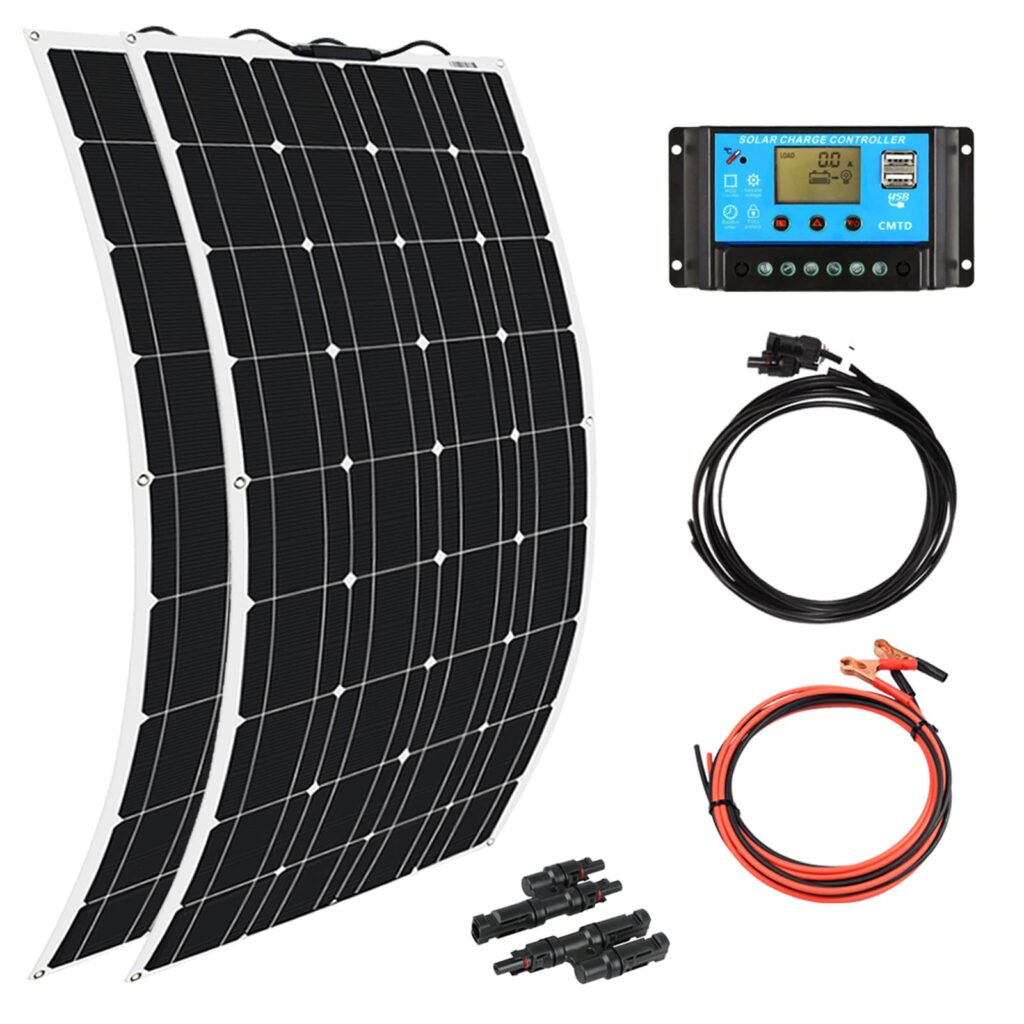
The XINPUGUANG Flexible Solar Panel is a reliable and efficient choice for RV users looking for a solar solution even on curved surfaces.
Pros
- High-quality monocrystalline silicon cells for excellent performance
- Highly durable, withstanding extreme temperatures and weather conditions
- Flexible design, suitable for curved surfaces on RVs, boats, and other vehicles
Cons
- Some users report lower output compared to solid panels
- Glossy finish may be less aesthetically pleasing for some users
- Charge controller buttons can be finicky
XINPUGUANG’s flexible solar panel offers high efficiency and excellent performance, even in low light conditions. The monocrystalline silicon cells used in the panels ensure you get the most out of your solar energy harvest. This solar panel is an ideal choice for those who want to install solar panels on a curved RV roof or other irregular surfaces on boats and vehicles.
The durability of this solar panel is impressive as it can withstand high wind pressure, snow loads, and extreme temperatures. This makes it a reliable option for those who plan to use their RV in different weather conditions and geographical locations. The flexible design ensures that the installation process is smooth and easy, adapting to various surface shapes.
On the other hand, some users have mentioned that despite being labeled as 200W, the output can be slightly less compared to solid panels. Furthermore, the glossy finish on the panels might not be appealing to everyone, regarding aesthetics. Lastly, the charge controller buttons might require extra attention while using, as they can be somewhat finicky.
In conclusion, the XINPUGUANG Flexible Solar Panel 200W is a practical and efficient option for RV owners who need a solar panel capable of fitting on curved surfaces. The high-quality monocrystalline silicon cells and durability make it a reliable investment, despite some reported drawbacks.
Codi Solar Flexible Solar Panel 100W
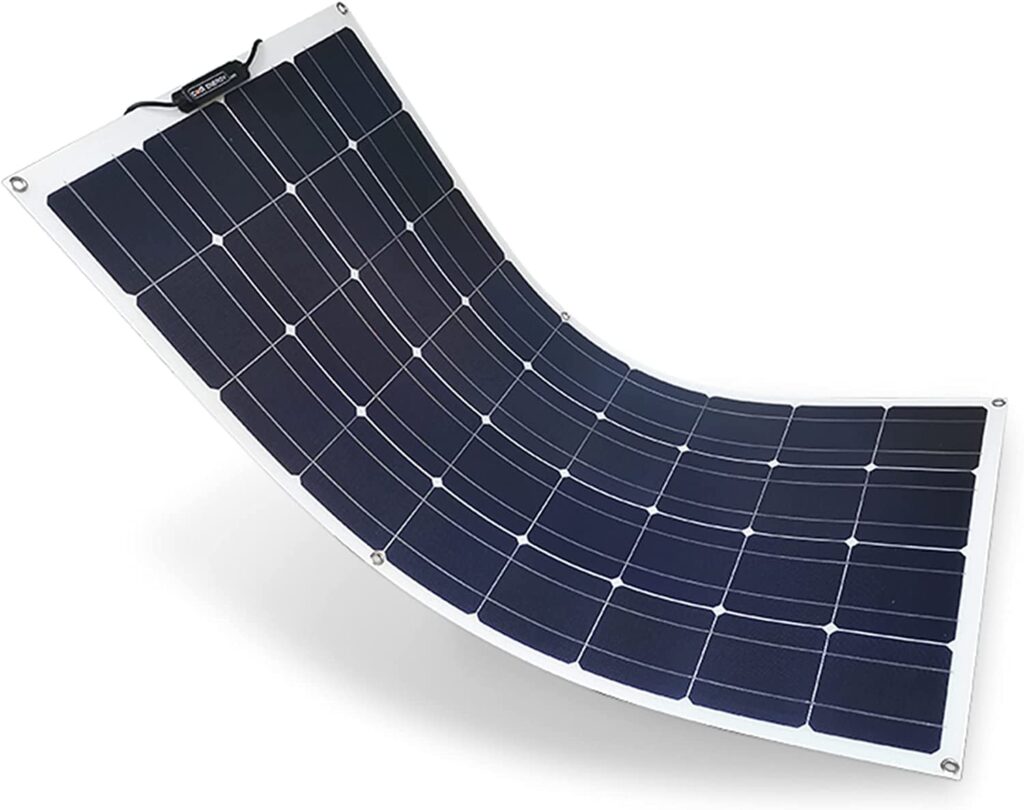
The Codi Solar Flexible Solar Panel is a solid choice for RV owners seeking high-efficiency charging with excellent bendability.
Pros
- Great bendability up to 250-degree arc
- High conversion efficiency with unique technology
- Durable, waterproof and temperature resistant
Cons
- Size may be awkward for some setups
- Less efficient under cloudy conditions
- Some users reported lower power output than advertised
The Codi Solar Flexible Solar Panel is an innovative product that stands out with its advanced encapsulation material, which ensures protection for the delicate solar cells, making it impressively durable and able to withstand people walking on it. Its incredible bendability, up to a 250-degree arc, makes it an excellent option for RVs, boats, and other curved surfaces that require flexible solar panels.
One of the main advantages of this solar panel is its high conversion efficiency made possible by the unique back contact technology and transparent dots on the surface that gather sunlight from different angles. This efficient design increases solar conversion rate, allowing users to get the most out of the sunlight, even in less than ideal conditions.
However, there are some drawbacks to Codi Solar’s flexible solar panel. The size might be unusual for some users in terms of their particular mounting needs, and its performance under cloudy conditions could be better in comparison to other brands. Additionally, a few users have reported lower power output than advertised, which could impact the overall satisfaction level of certain customers.
In conclusion, the Codi Solar Flexible Solar Panel offers a unique solution for those needing a bendable, efficient, and durable solar panel for their RV or other unconventional setups. Despite a few shortcomings, it remains a popular choice for RV owners looking to charge their batteries with clean, renewable energy.
XDAY Flexible Solar Panel 100W 18V Monocrystalline
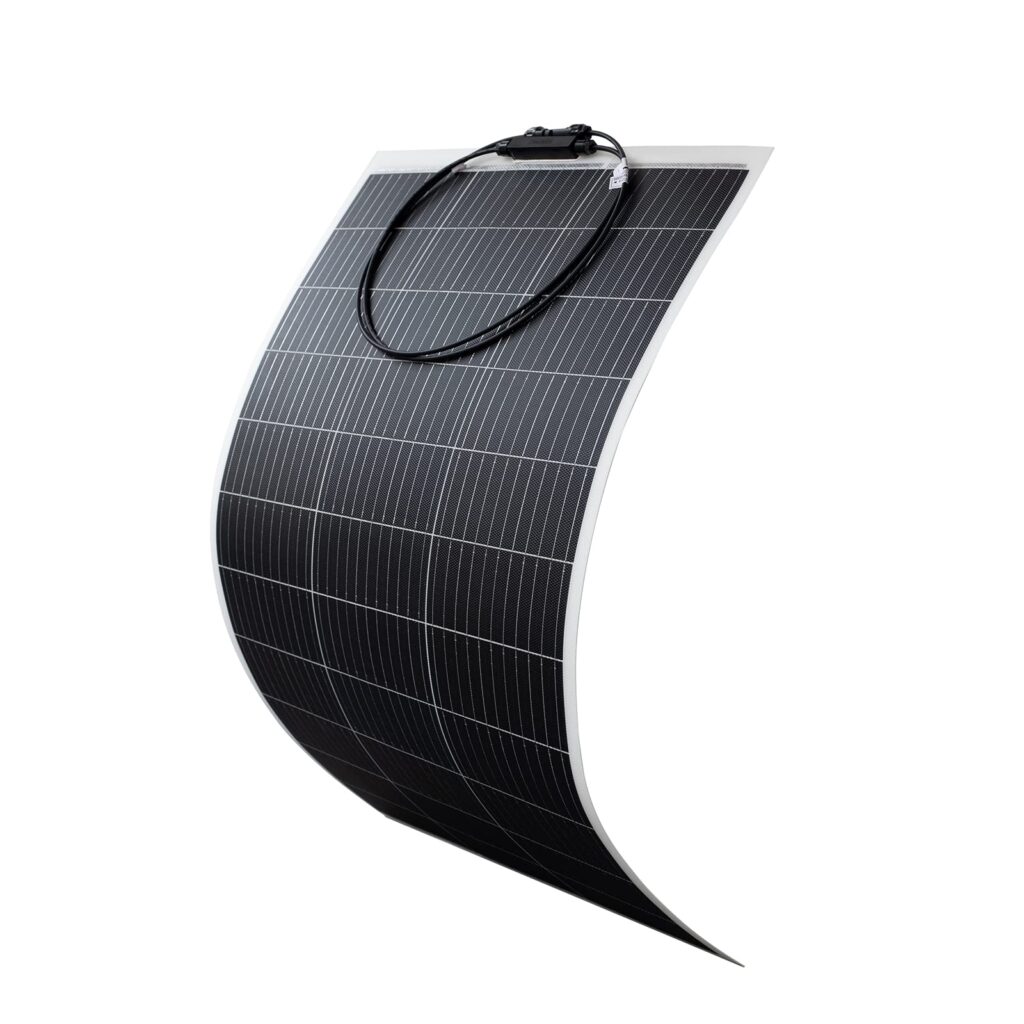
We recommend the XDAY Flexible Solar Panel for those seeking a lightweight, efficient off-grid power solution for their RV.
Pros
- Excellent power output with up to 600 Watt-hours per day
- High conversion efficiency of up to 23% due to industry-leading technology
- Extremely flexible, making it suitable for curved surfaces and various applications
Cons
- Might not be suitable for those with limited mounting space
- Requires additional mounting materials as no mounting holes are present
- Not foldable, only bendable
The XDAY Flexible Solar Panel is a versatile power solution for RV enthusiasts looking to harness solar energy on the go. Its lightweight and bendable design allow it to conform to a variety of surfaces, including curved roofs or uneven installations, providing a unique advantage over traditional rigid panels. With an impressive power output and conversion efficiency of up to 23% on sunny days, this flexible solar panel ensures that you can maximize the available sunlight to meet your off-grid energy needs.
Despite its numerous advantages, the XDAY Flexible Solar Panel comes with a few drawbacks. For those with limited mounting space, this solar panel may not be the ideal choice. Additionally, since it doesn’t come with pre-installed mounting holes, users will need to purchase additional materials to properly secure the panel. Lastly, though it’s bendable, don’t expect it to fold completely; it still maintains some rigidity to ensure durability and long-lasting use.
In summary, the XDAY Flexible Solar Panel offers an innovative, reliable, and user-friendly solution for RV enthusiasts seeking off-grid power. Although it has a few minor drawbacks, its excellent power output, high-efficiency technology, and unmatched flexibility make it a worthwhile investment in the pursuit of sustainable energy.
Buying Guide
When looking for the perfect flexible solar panel for your RV, there are a few important features to consider. We’ll help you make an informed decision by discussing these key factors.
Efficiency
One of the first things we should look at is the efficiency of the solar panel. This refers to how well it can convert sunlight into electricity. Higher efficiency means more power generation, which is crucial when you’re on the road in your RV. Look for panels that have a higher conversion rate, generally above 15% for good performance.
Wattage and Size
Think about how much power you need for your RV and choose the appropriate wattage. Also, take into account the available space on your RV’s roof. Flexible solar panels come in various sizes and wattage ratings, so finding the right fit that meets your power needs and available space should be a breeze.
Durability
Since you’ll be travelling and exposing your solar panels to various weather conditions, it’s essential to ensure they are durable and weather-resistant. Look for panels that can withstand harsh environments, such as high UV exposure, heavy rain, strong winds, and even hail. A good-quality flexible solar panel should last for at least 5-10 years.
Installation
Installation is another important aspect to consider. Aim for solar panels that come with easy installation features, such as adhesive backing or pre-drilled mounting holes. It’s also helpful if they’re lightweight, making it easy for you to install them on your RV’s roof on your own.
Remember, when searching for the ideal flexible solar panel for your RV, it’s crucial to prioritize efficiency, wattage and size, durability, and ease of installation. By keeping these factors in mind, you’ll be well on your way to finding the perfect solar panel to power your adventures. Happy travels!
Frequently Asked Questions
How do I choose the right size of flexible solar panels for my RV?
To choose the right size of flexible solar panels for your RV, we need to consider your energy consumption and available space on the RV roof. First, calculate your daily energy needs by adding up the power consumption of all devices you plan to use. Next, determine the number of hours of sunlight exposure your RV will receive on average. With this information, we can estimate the required wattage of solar panels to meet your energy needs.
Consider the available space on your RV roof for mounting the solar panels. Flexible solar panels come in various sizes and wattage options, so pick one that fits well in the available space and meets your energy requirements. It’s always a good idea to consult with a professional solar installer for personalized advice.
What should I be aware of when using flexible solar panels on my car or RV roof?
There are a few things to be aware of when using flexible solar panels on your boat or RV roof. First, ensure that the solar panel is securely attached to the roof to prevent it from coming loose while driving. Use a high-quality adhesive, and pay attention to weight distribution to prevent potential damage.
Flexible solar panels can become hot under direct sunlight, so make sure they have good airflow for cooling. Installing them slightly elevated from the car or RV roof can help with this and ensure better efficiency.
Another thing to consider is regular cleaning and maintenance. Dust, dirt, and debris can affect the performance of solar panels, so make sure to clean them periodically to keep them operating at optimal efficiency.
Why use flexible solar panels?
Flexible solar panels offer several advantages compared to their rigid counterparts. One of the main reasons to use them is their versatility in terms of installation. Since they’re flexible, they can easily be installed on curved surfaces like the roof of an RV or a car, making them ideal for these applications.
Another advantage is their lightweight design, which reduces strain on your vehicle’s roof and makes installation easier. Flexible solar panels are also more resistant to impacts and vibrations, allowing them to withstand harsher conditions on the road.
In summary, flexible solar panels are a great option for your RV due to their versatility, lightweight design, and durability, making them perfect for meeting your energy needs while on the road.

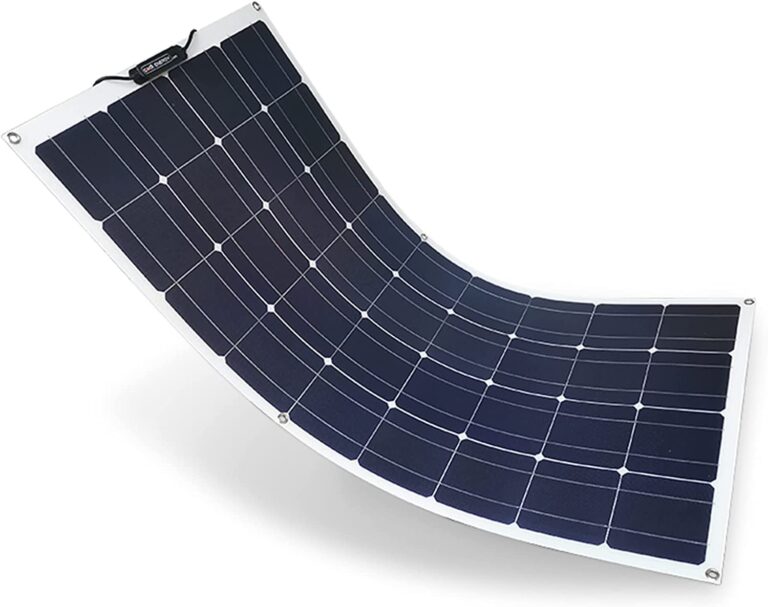
1 thought on “Flexible Solar Panels for RV: Top 6 Picks”
Comments are closed.